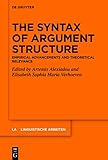The Syntax of Argument Structure : Empirical Advancements and Theoretical Relevance / ed. by Artemis Alexiadou, Elisabeth Sophia Maria Verhoeven.
Material type: TextSeries: Linguistische Arbeiten ; 581Publisher: Berlin ; Boston : De Gruyter, [2021]Copyright date: ©2021Description: 1 online resource (V, 204 p.)Content type:
TextSeries: Linguistische Arbeiten ; 581Publisher: Berlin ; Boston : De Gruyter, [2021]Copyright date: ©2021Description: 1 online resource (V, 204 p.)Content type: - 9783110757156
- 9783110757347
- 9783110757255
- 410 23
- P121 .S96 2021
- online - DeGruyter
- Issued also in print.
| Item type | Current library | Call number | URL | Status | Notes | Barcode | |
|---|---|---|---|---|---|---|---|
 eBook
eBook
|
Biblioteca "Angelicum" Pont. Univ. S.Tommaso d'Aquino Nuvola online | online - DeGruyter (Browse shelf(Opens below)) | Online access | Not for loan (Accesso limitato) | Accesso per gli utenti autorizzati / Access for authorized users | (dgr)9783110757255 |
Frontmatter -- Contents -- The syntax of argument structure -- Too strong argument structures and (un-)prepared repair -- Evidence against lexicalist or configurational approaches to structural encoding in sentence production -- Case marking affects the processing of animacy with simple verbs, but not particle verbs -- Unexpected (in)animate argument marking -- Interpretability, aspectual coercion, and event structure in Object-Experiencer verbs: An acceptability study -- Discourse and unaccusativity -- Index
restricted access online access with authorization star
http://purl.org/coar/access_right/c_16ec
Bridging theoretical modelling and advanced empirical techniques is a central aim of current linguistic research. The progress in empirical methods contributes to the precise estimation of the properties of linguistic data and promises new ways for justifying theoretical models and testing their implications. The contributions to the present collective volume take up this challenge and focus on the relevance of empirical results achieved through up-to-date methodology for the theoretical analysis and modelling of argument structure. They tackle issues of argument structure from different perspectives addressing questions related to diverse verb types (unaccusatives, unergatives, (di)transitives, psych verbs), morpho-syntactic operations (prefixation, simple vs. particle verbs), case distinctions (dative vs. accusative, case vs. prepositions), argument and voice alternations (dative vs. benefactive alternation, active vs. passive), word order alternations and the impact of animacy, agentivity, and eventivity on argument structure. The volume will be of interest to theoretical linguists, psycholinguists, and corpus linguists interested in the syntax of argument structure and its modelling using precise empirical methods.
Issued also in print.
Mode of access: Internet via World Wide Web.
In English.
Description based on online resource; title from PDF title page (publisher's Web site, viewed 25. Jun 2024)


